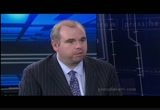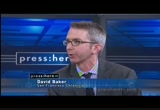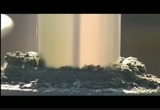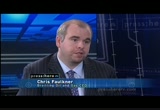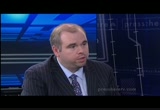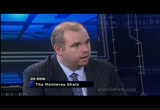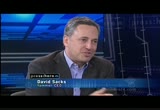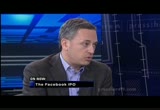tv Press Here NBC May 6, 2012 9:00am-9:30am PDT
9:00 am
another oil company wants to begin hydraulic fracturing in northern california, home to some of the world's most vocal environmentalists. chris falkner, ceo of brightling oil discusses the problem. and getting ready for a facebook ipo. an insider's view from david sacks. our reporters from the san francisco chronicle and fortune this week on "press: here." good morning, everyone. i'm scott mcgrew. it is surprisingly difficult to tell when you are in the midst
9:01 am
of a revolution. take the internet revolution, it changed the world. it is hard to pinpoint when we all realized that. i propose it is possible we are in the midst of another world changer. this time in energy. >> hello, oklahoma! >> over the last few years, the u.s. government and energy companies have both come to the conclusion that the united states is sitting on huge deposits of natural gas, far more than anyone guessed. enough to power cars and electrical plants and just about anything else for hundreds of years. in fact, the united states could become a net exporter of energy, which could reduce or even eliminate the trade deficit, and of course reduce our dependence on the middle east. now, that natural gas and some oil, too, is locked in shale rock. energy companies have figured out how to drill down, turn the
9:02 am
bit sideways, and create tunnels deep within the earth, which are then pumped full of water, sand and chemicals, fracturing the rock and releasing the gas. this so-called fracking which is very controversial is happening all over the united states, most notably in north dakota. more recently, here in the monterey shale in california, home to some of the most vocal environmentalists in the world. chris falkner is ceo of blightling gas and shale. he claims the environmentalists have the upper hand in the argument over fracking. he says it is the industry's fault they do. all i know about fracking comes from environmentalists. oil companies have not been terribly public about what's going on with fracking.
9:03 am
most people are only vaguely familiar with it. >> i think as an industry, we let other folks get the upper hand and speak for us, you speak of environmentalists, they have done a good job coming to the curve and we're late to the party with scientific data and truth behind fracking. people don't realize the first well was fracked in kansas in 1941. but no one has been talking about fracking except the last two years. >> it is one of those things people -- we alluded to this in the setup piece, people don't realize how big this is, both the discovery of how much natural gas the united states has, a staggering amount, and secondly that someone has over the past few years gotten pretty good at the process of getting it out of shale rock. these are revolutionary changes. >> game changers for the industry. since the 1970s, we have been in heavy decline in the united states.
9:04 am
all of the conventional resources, easy to get to oil and gas has been exploited, produced, and it has been declining. until 2005 essentially, we were going to import a massive amount of natural gas to the country to meet our own energy needs. then literally overnight, those forecasts changed from import to export potential in the next couple years because we found so much natural gas, in a short amount of time, because of fracking and horizontal drilling, we don't know what to do with the natural gas. don't have an energy policy domestically that uses it for power or transportation. now we have to hot potato it out of the country, get rid of it to asia or europe to decrease supplies because there's no demand in the united states for this supply of gas. >> isn't one of the concerns with fracking it put damper on renewable energies like solar and wind and other efforts that have gone on? >> it made the prioritize of natural gas as the fuel
9:05 am
alternative to oil, and it has given second thought to renewables plan. i think renewables are a piece of the energy mix long term, but a small one. i don't think it will flip flop to where renewables take that and gas is a back seat. >> people getting methane into drinking water, people with their own water wells, other complaints about some of the chemicals involved in fracking, chemicals placed inside the wells also getting into the water. what's response to the environmentalists who have gotten in front of the industry on this. >> you have two questions. one is biogenic methane, methane that comes into water wells from shallow gas wells. there's been examples in the movie gas lamp, you can light the water faucet on fire in certain areas in wyoming and
9:06 am
colorado, there are stories back to 1936 where they light the water faucet on fire. biogenic escaped methane from gas wells to have well born integrity issues, shallow, near a water well or from the example from the movie, the gentleman drilled too deep into an area, that had nothing to do with fracking. the chemical issue with fracking, there's 60 to 70 chemicals used in small quantities. >> why? >> after the lubricant, viscocity, to get the water and sand to prop it into formation, you inject the water in the hole high pressure, the chemical lube ri indicates that sand to shoot it into formation and crack it open. some of the chemicals folks don't want to go around drinking obviously, but the reality is a water well is usually 2 to 300 feet below the surface. we are up here, fracking 8 to 10,000 feet miles below the
9:07 am
water ak wi furs, between none porous limestone and layers of earth. there's no inter connectivity to what we do two miles and 200, 300 feet below the surface. >> particularly in the city of california, not only are people behind the curve on fracking, but governments are behind on fracking. there tend to be few state regulations about fracking. north dakota is probably more hip to it than california. >> texas as well. and there's regulations around fracking but it is evolving. the epa is giving signals there will be federal regulation and mandates coming, but they're not here yet. right now, states are regulating the issue. most states have a governing body around oil and gas, not as far as texas, they have been doing it a hundred years there, even north dakota is trying to evolve their issue. these state organizations are doing the best they can with
9:08 am
fracking. we have the frack act in texas, and that requires disclosure of frack fluid. we are disclosing what goes in the chemicals. we are working hard as an industry to remove them, make them water based or food grade safe so you could drink them if you want to. that is probably happening as we speak, it is probably a year or two away before the additives are ready for trial use. >> here is what i don't get with the issues with fracking and people complaining about well water being screwed up by fracking nearby. when people go out and investigate, lot of times they find it is a well integrity issue, a well, fracking was being conducted through had a problem with it that allowed methane to migrate into the drinking water. that can happen with any kind of well that you drill, whether for fracking or just regular oil and gas production. why are we hearing about that
9:09 am
particular problem so much with fracking? is there something about the fracking process, perhaps the pressure you are using that makes it difficult to do the well right? >> you make a great point. everything starts the second the bit hits the ground and what you call well bourne integrity. if you have a bad cement job and pump fluid at high pressure, has a possibility to give a twin and u lus, space between the casing and cement, you have an area there. if you have air in there, you have a space, fluid can get displaced and could connect into the water ak wi fur. everyone knows what a cement job is. that's the reason they filled the well the bp exploded. my mom now knows what that is and nobody did a few years back. you have to monitor pressure from the time you drill to the time you frack it. if you see any issue, you stop the frack job. a lot of guys in the industry aren't paying attention to those kind of things.
9:10 am
>> the reason i ask about that, does that just mean we need a different, tougher standard for how you drill wells that are going to be fracked than other wells? >> i think it goes back to responsibility. you're out there drilling a well, you have to have integrity in the well born and cell, number two, responsibility to be monitoring those things. >> and supervisor to check it off. >> fracking a well costs millions of dollars. we may frack for $4.5 million. i don't want the frack fluid disemployeesed not going into the well born, fracking the well, getting shot out by having a bad well born. there's responsibility from the way you drill and maneni the operations. >> we can take a break. the sensor is close to hitting the button. fracking. "press: here" will be right back.
9:12 am
welcome back to "press: here." chris falkner is an oil executive. david baker is an energy reporter. i'll step out of the way, let you ask. >> talk about california. in specific, we haven't had a lot of fracking here yet, but we have a gigantic oil shale formation covering a good portion of the southern end of the central valley, monterey shale. we heard a lot about the potential it may have with the federal government saying it could have 15 billion barrels if i remember right. >> that's right. >> but we haven't seen it take off yet. what kind of potential do you think is there? >> good news about the monterey shale, there's no other shale in the united states that matches it. it is young. deposited 10 million years ago versus 300 million years ago for other shale. that makes it a little better candidate, less brittle. they may not have to frack as big and hard as others. california is a different state to operate oil and gas wells in,
9:13 am
a difficult -- you will have to get in front of community relations. what we're doing in other states, even in texas, we are setting down local constituents and meetings and efforts in states to let folks know what we are doing, why we feel it is safe, showing them that data, what documentary film makers do to say fracking is bad. we need to get out ahead of the curve, show folks how things are going to work. knowledge is power with people. they want to understand. if they don't understand, they're afraid. that's why the industry is in the situation it is in because people are scared not knowing what we're doing. >> is it too late already? seems like people are freaked out about fracking and document trees have come out. >> it is what it is. we have to approach it in the best manner we can. we have to as an industry get more transparent, get out, talk to people, show how things are working. this is not a proprietary technique. fracking has been used almost 80
9:14 am
years, right? people have to understand it is tried and true, it has been tested, but it is going to be a difficult pitch in california, more so than in areas like texas where people see drilling rigs all the time. they don't want to see drilling rigs in santa barbara or in their backyard. in california, we have an uphill batter. >> mother nature has a bit of a sense of humor. 3.5 billion barrels of shale and monterey shale, 15 billion barrels. >> right. california is a populated state with a lot of environmental movement. >> we have more unemployment here and could use the tax dollars. >> thank you very much. chris falkner. you can talk about the facebook ipo, we talk with david sacks about silicon valley's most anticipated stock offering next on "press: here."
9:16 am
welcome back to "press: here." we had facebook executives on the show before, but can't do that now because the company is in its quiet period. fortunately, someone that knows the company well doesn't have a quiet period. david sacks is our second outspoken guest of the morning. one of the paypal mafia, the group that made its millions in the sale of paypal to ebay. he is a movie producer and troublemaker. he once got so angry at yahoo, he offered $25,000 to any employee who would leave. the ceo of yammer, a facebook like interface for companies to communicate with employees and franchise owners. david sacks' connection to facebook and the social world
9:17 am
don't end there. shawn parker is facebook's first president. joins us here, david sacks. this is not an ipo that facebook necessarily even wants. lots of companies are thrown into ipos, don't need, facebook doesn't needed money. >> ironically, the process of sudden motion last year when facebook exceeded 500 shareholder rule which no longer exists. last year they were forced to make public disclosures or filings this year, i think that kind of sort of set the whole thing in motion and forced their hand a little bit, and like i said, irony in face of the jobs act, that requirement is no longer around. it is interesting to wonder if there would be that feeling if that rule wasn't around. >> can't call it off at this point. too late. >> there's so much money involved in facebook, just in the revenue, just going to bank
9:18 am
the money off the ipo, i would expect. >> i think you know part of it is that facebook sees itself as a company in the same league as google, microsoft, apple, amazon, and it is, i think they want a war chest to fund any acquisitions they want to do and essentially have that. >> can you imagine an acquisition they couldn't do currently? >> well, their stock has already been semi liquid the past year or two. thanks to the secondary dairy market activity. having a publicly traded currency only helps that. i think part of the reason there's a secondary market for facebook shares is it was in anticipation of the ipo. people knew they would be public at some point soon. without that, without having publicly traded currency, it is harder to do acquisitions. >> do you think other than making a lot of people very rich
9:19 am
and moving up the rental and real estate prices more, do you think this is good or bad for facebook? >> well, it was inevitable, i would say. i think the company waited quite a long time by standards, they waited eight years to ipo. and so they're going to have to do it at some point. zuckerberg said when he took money, he took on an obligation -- it would happen at some point. it is a reasonably good time to do it. >> you once said not having a social network in business because you do social network in enterprise is like not having a phone system or eventually will be. is there a chance facebook could wander into your business or do you expect them to stay social while you stay for enterprise? >> i think it is a separate space. we started working on yammer in 2007, the basic belief we had was social networking wouldn't
9:20 am
want to just stay in the consumer space. once people were comfortable in their personal lives, would want to communicate with co-workers. companies have a need for private and security. i don't think there are any companies that would want their internal communications to be broadcast on facebook, where employees could play mafia wars or accidentally post something. >> i don't think a lot of employees want their company's business in their facebook either. >> i think there's need for separation of privacy for the companies and for the employees, there's value to having separate contacts for your communication. the same reason you need home and an office, you need a personal social network and work social network. >> if they don't go into your space, take you guys on, where else do they grow? what other things can they expand into because they offer, you can do pretty much anything with your facebook page these
9:21 am
days. what's left? >> a few more billion that aren't on facebook. >> there are. >> also add services. >> so obviously they're going to grow the user base until they have virtually everyone online. about to get to a billion users. that process will continue. to your point, what do they layer on next, i think facebook is a business laden with option value. they could go into search and challenge google. they could open up their advertising to the rest of the internet to compete with google accents. a lot more they could do on mobile, with verticals. they could basically go into entertainment, not in terms of concentration but in terms of a portal. there are so many things they could do. >> we tend to forget there are some things facebook can't do. if somebody said something two weeks ago i found fascinating, the ability for me to search, i can search for her, but can't
9:22 am
search what was that restaurant. i didn't notice, somebody pointed out, it is not relevant to me, you can't i don't think search only single women in your social network. nor have i. but if you needed to. and apparently there's some need to. or single men or whatever else. there are lots of things when you take a step back from facebook and look, you say wait, you can do that? there's growth there as well. >> the way that facebook has dealt with those opportunities until now are through the platform. there are dating applications built on top of facebook's social graph. i think that's their preferred method of getting into the industries. they want to see zynga, they took over virtually every industry. they will see what psychiatrist
9:23 am
th -- industries they want to go after to. >> facebook got criticism for things in place and privacy issues. do you think that will come in the limelight once all of this is over and done with and the ipo is done? >> i think like you said, facebook has gotten into trouble in the past i think overaccommodation of aggressive privacy defaults, along with complexity and user interface, led people to believe facebook wasn't protecting their data. i think if you look at facebook relative to virtually any other site, its privacy controls are more robust. i can't think of another site that provides that way to control your data. you could argue it is too complex and too many settings and controls, but i actually think facebook, part of why it has been successful relative to other types of networks or products like it is because its
9:24 am
privacy controls are so robust. >> speaking of controlling your own data, you guys have an interesting model and way of doing business where you kind of -- it is very viral. it is a little like facebook in the sense that people can sign up, anyone can sign up, start using yammer, at some point it spreads through a company. if it or the tech side want to control what's going on, they have to pay, right? can you explain that business model? it is clever. and it has gotten criticism, too. >> the business model is based on consumerization, the most powerful source in enterprising today. we have seen it on the device side, with byod, bring your own device, employees bring their iphones and ipads to work, seeing the same on the software side. employees are empowered to bring the software that will help them be most productive.
9:25 am
>> byos. >> bring your own software. >> only a percentage of employees use social -- enterprise social. you think it would be easier to drag co-workers in and say come on, we use facebook, we know how it works, let's do our projects on yammer or chatter. >> yammer spread into 2,000 companies. what first had to happen was social networking in consumer space had to get to this level of ubiquity that it now is for people to realize they want this type of communication in the workplace as well. >> we have just a couple of minutes left. want to get to one thing i referred to in the setup piece. you offered money to yahoo employees. explain that. $25,000 to leave yahoo. it worked for you. >> i was trying to give yahoo employees motivation in light of
9:26 am
management's decision to become patent troll. it captured the attention of silicon valley because it is a fighter of the future of silicon valley. silicon valley continue to be a place of unfettered innovation, where innovative companies are reward, companies that don't keep up face the process of creative destruction, or is it the type of place where dying companies can hold on through lawsuits. >> put your money where your mouth was. >> exactly. >> just a couple seconds. anyone take you up on it? >> got close to 100 applications. we hired a bunch of people. made five offers. >> thanks for being here. >> thanks for having me. >> "press: here" back in a moment.
9:28 am
155 Views
IN COLLECTIONS
KNTV (NBC) Television Archive
Television Archive  Television Archive News Search Service
Television Archive News Search Service 
Uploaded by TV Archive on

 Live Music Archive
Live Music Archive Librivox Free Audio
Librivox Free Audio Metropolitan Museum
Metropolitan Museum Cleveland Museum of Art
Cleveland Museum of Art Internet Arcade
Internet Arcade Console Living Room
Console Living Room Books to Borrow
Books to Borrow Open Library
Open Library TV News
TV News Understanding 9/11
Understanding 9/11



